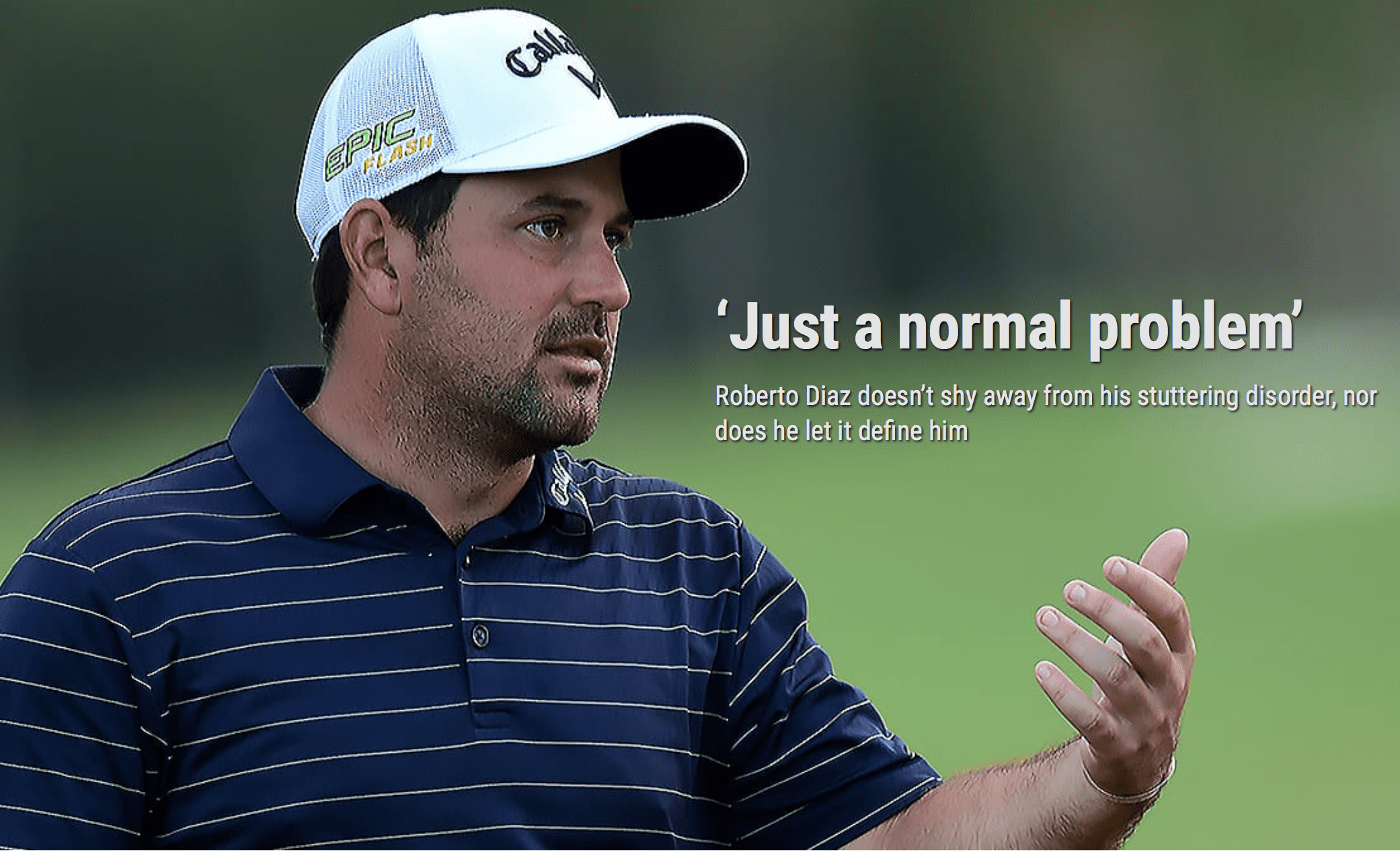Just a normal problem
by Chris Cox
PGATour.com
All professional athletes, at some point in their careers, will take their turn at the media dais. Some are masters of this craft, sparring with the media while eloquently deliberating on any number of topics. For others, it represents a tedious obligation that comes with the job, a necessary requirement before venturing to far-less-mundane activities.
But rarely do we consider the ones truly terrified by this aspect of sport. After all, no one else on the planet possesses the talent of these players. And every week, they handle some of the greatest and most fearsome pressures their games can offer. What’s so difficult about answering a couple of questions?
Consider the case of Roberto Diaz.
“I got in a situation at the World Golf Championships in Mexico where I had to introduce myself in public to writers and thank the tournament in a press conference,” Diaz recalls. “I couldn’t start. I was at the podium for like two minutes. I couldn’t say a word. That was probably the worst experience I ever had.”
Diaz, in the field at this week’s Valero Texas Open, is one of golf’s fastest-rising Mexican stars. In his second year on the PGA TOUR, he already has carded a pair of top-25 finishes, including a tie for 10th at the Puerto Rico Open. Last November, he teamed with close friend Abraham Ancer to deliver Mexico a tie for second at the ISPS Handa World Cup of Golf.
His game has never been better, he believes.
But get the 32-year-old into an interview setting with Spanish media and suddenly he does not appear so invincible.
Diaz and I share quite a bit in common. We’re about the same age, have roots in the Myrtle Beach area and attended school 60 miles apart—Diaz graduated from the University of South Carolina Aiken, while I graduated from the University of South Carolina.
We also carry the burden of a stutter.
In our first conversation a few days ago, we quickly commiserated over these common afflictions. If you’re unaware, here are the basics: Stuttering is a communication disorder where the flow of speech is broken by either repetitions, prolongations or stoppages. There is no cure, but it can sometimes be curtailed with speech therapy.
We discuss the tendencies in which ours occur — usually in situations where we are nervous or excited — and the letters that most often trip us up: Q, R and C for him; L, S and W for me. We also connected over how we strategically avoid expressions we know will cause us trouble.
“I add words between words to avoid stuttering,” Diaz explains. “For example, if I use a small word before my name, like if I say, ‘I am Roberto’ instead of just ‘Roberto,’ I know that I won’t stutter.”
Doesn’t it seem like such a cruel joke? Here is Diaz, one of the lucky few to call himself a PGA TOUR player, and he sometimes can’t even say his own name. (He typically refers to himself as Bobby anyway to avoid this issue.)
His sister, Isabella, has a similar problem. She struggles with the letter G and, naturally, her husband’s name is Goyo. Talk about the ultimate irony.
“By now, I’ve been stuttering for almost 20 years, so I know which words I’m going to get stuck on,” Diaz says.
Perhaps the most unusual aspect in all this? Diaz is bilingual, yet he only stutters when speaking Spanish, not English.
I debated whether or not to take this story when it was first pitched to me. I’ve lived with a stutter for as long as I can remember and, while it’s a crucial aspect of the person I am, I’ve never tried to draw added attention to it.
But Diaz is open and transparent about his speech difference. If anything, he embraces it with pride when confronted about it.
“They’ve never been in the shoes of somebody speaking in public and not being able to start talking, so they don’t know what it feels like. That’s the reason why I’m pretty open about it. Friends have even nicknamed me after the cartoon character Porky Pig, and I just ride the nickname pretty well. It’s in my email address.”
That’s one of the more important steps a person with a stutter should take, according to Dr. Gerald Maguire, Chair of the Psychiatry and Neuroscience Department at the University of California, Riverside School of Medicine.
He should know. He also stutters.
“I advise people to not hide it and accept stuttering,” Dr. Maguire says. “If you accept it, that’s the first goal to feeling free about it. So many of us, we have so much avoidance around our speech that we don’t speak up. We don’t realize our dreams because of the fear of stuttering.”
Maguire, coincidentally enough, spoke with me on the way home from a public-speaking obligation in Israel as part of his duties as the board chair of the National Stuttering Association. His team will soon begin studies on medications that could treat the impediment.
“Here I was just 10 minutes ago going through security and they’re asking me all these questions about why I’m here,” Maguire said. “I stuttered some and thought, ‘God, they’re going to think I’m (crazy).’ All the time people think we’re nervous, anxious or hiding something.”
“But I always say that just because it may take a little longer to say what you have to say doesn’t mean you can’t communicate well. There’s so much more to communication. Don’t substitute the words you want. Say what you’re going to say. Speak up. It might just take you a little bit longer to say it. Be open about it.”
Diaz is more than transparent, and he isn’t the only athlete doing so. Ron Harper, a five-time NBA champion with the Chicago Bulls and Los Angeles Lakers, donates much of his time to the National Stuttering Association. Houston Astros center fielder George Springer is a spokesperson for SAY: The Stuttering Association for the Young.
Even in golf, Diaz is joined by five-time LPGA winner Sophie Gustafson, who used her own personal troubles with speech to positively influence children battling the same problems. In 2012, the Golf Writers Association of America honored her with the Ben Hogan Award after she courageously stepped into the spotlight and embraced her speech in a candid sit-down TV interview.
“I remember walking up to the set with [LPGA pro] Val Skinner and telling her I was more nervous now than I would be on the first tee come Friday morning. I’m happy to say it was well worth it,” Gustafson said in her GWAA acceptance speech. “The response I’ve gotten from it has been truly overwhelming. I could never have dreamed there would be so many people out there inspired by the few words that I said.”
Gustafson really means it when she says “we all” can be heard. According to the NSA, one out of every 100 adults has a stutter, with three million Americans alone suffering from the disorder. It impacts more than 70 million people worldwide, or one percent of the total population.
Five percent of all children will go through a stuttering phase, the majority of them growing out of it before adolescence. Speech disruptions affects men four times more than it affects women.
No one is in this alone. Diaz and all the bevy of other sports stars can certainly attest to that.
“I think it means a great deal for Roberto to be open about it. I’d really like to meet him,” Dr. Maguire says. “I want to thank him for being a role model and not hiding and avoiding anyone because of his stuttering. He’s reaching out and becoming an inspiration to all of these young kids who aspire to do anything. “
But Diaz will tell you he’s just being himself, warts and all. He laughs right alongside Ancer and caddie J.P. Solis when they “remix” his speech like DJs during a stutter.
“At the World Cup, whenever we had to do interviews as a team in front of each other, it was brutal, because he knew it was coming and I knew it was coming, and we couldn’t stop laughing,” Ancer says. “I’m not trying to bully him or anything, we’re really good friends. I know he can take it.”
“And sometimes it can be frustrating. It’s obviously something that he wants to not do, and it just kind of comes out. People that have that issue, they shouldn’t be shy about it or anything, just laugh about it. It’s really the right approach to go at it, for sure.”
Sometimes laughing about it is all you can do, Diaz says. Why hide something that’s so important to who you are?
“It’s just a normal problem. People have different problems,” Diaz explains. “There are people who have bad cholesterol. There are people who have bad respiratory issues. There are quiet people, shy people. Everybody’s different. What differentiates me is a stutter.”
“People who haven’t experienced it don’t know what’s going on, and they don’t understand how it can impact a kid or impact a person. Once you understand that it’s just a normal problem, I think your life becomes easier.”
Thanks for the advice, Bobby.
This article originally appeared on the PGA Tour website at: https://www.pgatour.com/long-form/2019/04/02/just-a-normal-problem.html
Chris Cox is a senior manager of international communications for the PGA TOUR, where he works with the TOUR’s 89 international players. Follow him on Twitter @chrisbcox

